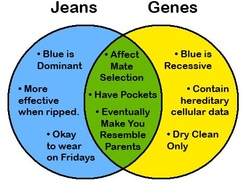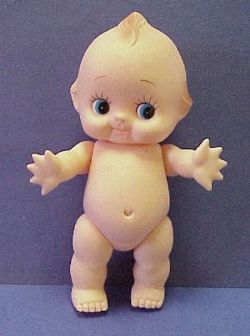 Borrowed from http://runningahospital.blogspot.com Every time I do anything even remotely ingenious, dorky, or with the aid of a list, my father says, "Genes work!" When I was younger, I was embarrassed by this, thinking that the comment was heavy on the "dorky" and light on the "ingenious" because my father shares my penchant for self-deprication. But as I've grown up a bit more, I realize that he's saying this as a compliment. He's proud of his achievement. Biologically, scientifically speaking, we are a legitimate species if we can produce reproductively viable offspring. In plain-speak: we all want to be grandparents. I think this goes beyond weekends at grammy's, cookies and fishing. In fact, I think it goes far beyond biology. While my father takes pride in passing along my genetic code, including my Lithuanian green eyes and my exceptionally long monkey toes, I believe that the true source of his pride lies in the things he taught me both explicitly (the genius of list-making and preparedness) and accidentally (geek-speak). Although he always threatens to write a memoir, my father isn't a big writer. He's a story teller. As am I (and I'm equally terrified to write anything actually significant). Perhaps what scares me most about possibly becoming a parent, is the fact that I'll be sharing not only what I hope to share with my children (my world-class packing skills), but what I might inadvertently share (my irrational fears of news media, basketball, cats, and the body scan at the airport). I believe that children pick and choose the best parts of their parents and other adults and emulate what they can. I also know that some darkness transfer is unavoidable. But I believe it is our duty to our species and our planet to leave things better than we found them. To weed through the muck and hand over a slightly better version of ourselves to the next generation. Prepare to be an AWESOME Grandma/pa: 1. Identify the habits that you are least interested in sharing with your offspring. Perhaps there is some disordered eating behavior in your past or a love of slot machines. Consider getting professional help managing these issues, rather than hoping you will hide them from your children. Remember when your parents tried to hide things from you? Exactly. It doesn't work. 2. Get rid of the things you don't want your children to find. Perhaps there are some juicy love letters that you'd rather not share with your 13 year old. Get a safety deposit box or off site storage unit now. 3. Tidy your relationships with your partner, parents, siblings, and neighbors. Unless you want your toddler to call the crotchety neighbor "Mr. S#its," as you have, clean it up now. 4. Cultivate your quirks. Aside from their teen years, when they are most likely to harbor intergalactic parasites, your child has the potential to love even the weirdest things you do and consider them normal. Do you remember going to junior high and realizing that no one else had parents who wrote the date on everything coming into the house? Do you remember how normal your parents' behavior seemed to you? 5. Open yourself up to new ideas and foster a willingness to let your children change you. As a family, you'll get to create new norms and values.
0 Comments
 What my baby looked like, except she had pants. I was so excited when my parents came home from this hospital with my new baby brother (I was five years old and had had a baby of my own for years at that point, and thought it was about time my mom had one, too). As soon as he got home, I tried to share my expertise in baby handling, but was frequently informed that I was "too small" to hold the baby or that the baby was "too big" for me to carry around. After a few weeks, this became rather tiresome. While my parents made a concerted effort to keep me in the loop, I remember feeling sad that I now had to share my adoring audience with a baby who, unlike my baby, cried, pooped, and did not go into the bath with me. Two particular memories bring me back to this trying time: The Apocalyptic Meltdown: Immediately after his baptism, we opened the family home to (what felt like) three thousand of our closest friends. They all introduced themselves to me and immediately asked "How do you like your new baby brother?" I was a mostly polite child, and I liked when people talked with me, so I was kind and generous for the first 1,500 visitors. But the turning point came about an hour into the party (and before cake, if there was any cake) when I announced to the room that, "If one more person asks me how I like my new baby brother I'm going to my room and never coming out." You know how this ends. The Great Escape: A few weeks later, my mother on her last nerve and I on mine, I decided to illustrate my maturity and acrobatic strength and agility by scaling my brother's crib, removing him, and carrying him about 100 feet around the house and into the kitchen. When my mother tells this story, she says I "... missed hitting his head on the edge of the kitchen doorway by an eighth of an inch." In all fairness, everyone was right. I was a very small five year old, and he was a BIG baby. But no one anticipated the sheer force of my will. Tips for Keeping the Big Sibling from Absconding with the Baby Use your words. Tell the big sibling about how things will change with the new baby. This implies that you have a plan, which you should (separate post to follow about this). Prepare your friends. Encourage (or demand that) your friends and relatives greet the older child first when they come to see the baby. They don't need to bring a toy for the older child, but suggest that they plan to spend five minutes with the older sibling and then either have the older child introduce them to the baby, or have them break the conversation and move along. You're also training your older child to be great at cocktail parties! Practice with a puppy. (don't actually get a new puppy in the same year that you are welcoming a new baby into the house) Find a friend who has a newer baby animal that you can go and visit with your older child. Practice sitting quietly, perhaps on an adult's lap, and learning how to hold and be gentle with the puppy. This sets the stage for how you will later allow the older child to hold the baby (on an adult's lap, being gentle). Schedule special time. Baby gets lots of attention, particularly in the first six weeks. If you can utilize the services of a postpartum doula to give mom respite, then she can have special time with the older child. Same is true for her partner. Also be sure to schedule baby holding time if the child wants to hold the baby. Stock up on bribes. I don't recommend rewarding anyone with food, but this is a good time to bring in some special new toys or books for the older child. Regardless of the older child's gender, you might introduce a baby doll with all of the fixin's like diapers, bottles, nap blankets, and changes of clothes. If you are looking for other toys, I recommend those that make no noise, require no batteries, and are easy to enjoy alone. Building toys, puzzles, books, and art supplies are great options. |
About meI'm one of those people who loves making your life easier (and I believe in you). I am an experienced registered prenatal yoga teacher and a lactation educator. Want more? My monthly newsletter might be for you.
Archives
April 2014
Categories
All
|
 RSS Feed
RSS Feed
